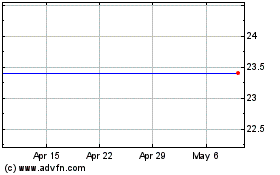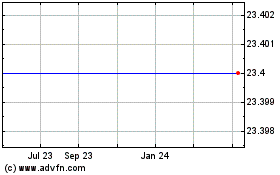By Jonathan D. Rockoff And Jeanne Whalen
A mail-order pharmacy used by Valeant Pharmaceuticals
International Inc. had a simple message for staffers charged with
getting health insurers to pay up: Don't take no for an answer.
If a health insurer wouldn't work with Philidor Rx Services LLC,
the pharmacy instructed staff to try again using the identification
number of a partner pharmacy to secure payment. "We have a couple
of different 'back door' approaches to receive payment from the
insurance company," a Philidor training manual said.
Canada-based Valeant has said that Philidor and its network of
pharmacies was "one of our competitive advantages," providing drugs
to patients and a source of sales growth. But use of the pharmacy
and its affiliates is drawing scrutiny from analysts and investors
concerned about the practice's sustainability.
Some analysts say aggressive tactics could backfire, angering
payers and slowing sales at a time when Valeant is under pressure
to show it can grow organically and not just through acquisitions.
At least one payer, Harvard Pilgrim Health Care in New England, has
said that it is reviewing its relationship with Philidor.
Industry experts say Philidor's use of different ID numbers is
unusual. The pharmacy's identification number "is always supposed
to be connected to the actual provider putting in the claim," said
John Norton, spokesman for the National Community Pharmacists
Association, a trade group.
The training manual for insurance-claim processors at Philidor
and other company documents reviewed by The Wall Street Journal
indicate the pharmacy went to great lengths to fill prescriptions
when insurers balked. Other instructions include tinkering with a
drug's price, lowering it until a payer's system accepts the claim,
and then raising it again to seek out a plan's maximum allowable
price. Other guidance suggests billing for a lower quantity.
"Philidor is the patient's advocate in seeking to ensure that
they receive the medication that was prescribed by their doctor at
the lowest possible cost to them. This includes following up with
insurance companies on behalf of patients," a Philidor spokesman
said.
Valeant, which has asked a committee of board members to examine
the company's relationship with Philidor and the pharmacy's work,
declined to comment.
Questions about Valeant's business practices and its
relationship with Philidor, along with federal investigations of
its drug pricing and other issues, have weighed on Valeant's stock,
which has lost more than half its value since peaking in August. In
recent days, a short seller has accused the company of using
Philidor in an accounting scheme, and former Philidor employees say
Valeant staffers worked directly in the pharmacy's offices,
sometimes using fake names.
Valeant said last week it acquired an option to buy Philidor
last December for $100 million and has defended its accounting.
The drug maker has said that Philidor doesn't restrict
prescriptions to any particular manufacturers, but former Philidor
employees say nearly all of the prescriptions the pharmacy filled
are for Valeant drugs.
The Philidor documents reviewed by the Journal reference only
Valeant drugs by name. PowerPoint slides instructing
insurance-claim processors use Carac, a Valeant drug for
ultraviolet-ray damage to the skin, as an example in a slide. The
training manual gives only a "Valeant Product and Program
Overview," citing drugs such as Valeant's acne medicine Solodyn and
toenail fungus treatment Jublia.
A bottle of 30 of Solodyn tablets can cost up to $1,040.41,
according to Truven Health Analytics, which publishes average
wholesale prices. An 8-milliliter bottle of Jublia costs
$1,075.72.
To control spending on such pricey medicines, health insurers
and companies that manage the plans' drug benefits use a variety of
tools, such as directing pharmacists to substitute a lower-priced
generic made by a different drug company, and asking patients to
pay higher copays. Sometimes, health plans reject a claim because a
drug costs too much.
Philidor used various means to lower patient copays. The
training manual, which has one page dated in July 2014 and another
in October 2014, outlined six different ways that Philidor staff
could lower patient copays to as little as $35. "They all
essentially do the same thing," the manual said, but using them
individually helps Philidor "know which insurances pay better than
others."
As far as overcoming rejections, the training manual advised
submitting a lower quantity for certain drugs to the payer "to see"
if the drugs would then get reimbursed.
The training manual discussed "back door" methods to receiving
payment from insurance companies in a section on dealing with
insurers "that we are not contracted with" and therefore won't pay
Philidor for any medicines.
The manual directed insurance-claims processors to first submit
claims using Philidor's unique identification number. If that
resulted in an error message saying Philidor doesn't have a
contract, the processors should use an identification number for
another pharmacy, such as "our partner in California, West Wilshire
Pharmacy." That pharmacy didn't respond to a request for
comment.
In May 2014, California's board of pharmacy denied Philidor's
application for a permit to operate as a pharmacy in the state,
saying the pharmacy had made "false statements," including some
that concealed Philidor's true owners and beneficiaries, according
to documents from the pharmacy board. A few months later, a
Delaware-registered firm affiliated with two Philidor executives
bought a 10% stake in West Wilshire Pharmacy, of Los Angeles.
Philidor has appealed the board's decision.
Other states where Philidor is registered as a pharmacy have
taken note of the firm's troubles in California. "We're reviewing
the information at hand, including the rejection in California,"
Cindy Hamilton, chief compliance officer at the Oklahoma State
Board of Pharmacy, said Wednesday.
The PowerPoint, which isn't dated, gave step-by-step
instructions on what to do when an insurance company electronically
rejected a prescription because the drug cost too much. It advised
rechecking the submission for any mistakes, and calling the
insurance company for an override.
"If override is successful...Great!!!" the PowerPoint said.
If not, it directed tinkering with the cost of the drug until
the insurance company agreed to pay. Specifically, the manual
advised dropping the drug's cost in $500 increments. "until paid
and then increase by $100 to get as close as possible to the max
amount allowed by the insurance company."
Write to Jonathan D. Rockoff at Jonathan.Rockoff@wsj.com and
Jeanne Whalen at jeanne.whalen@wsj.com
Subscribe to WSJ: http://online.wsj.com?mod=djnwires
(END) Dow Jones Newswires
October 28, 2015 19:55 ET (23:55 GMT)
Copyright (c) 2015 Dow Jones & Company, Inc.
Valeant Pharma (NYSE:VRX)
Historical Stock Chart
From Mar 2024 to Apr 2024

Valeant Pharma (NYSE:VRX)
Historical Stock Chart
From Apr 2023 to Apr 2024
